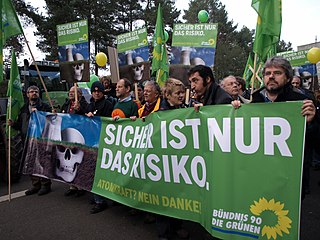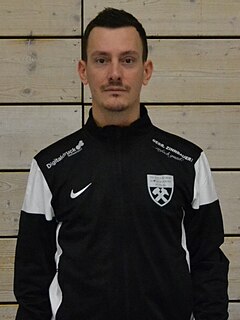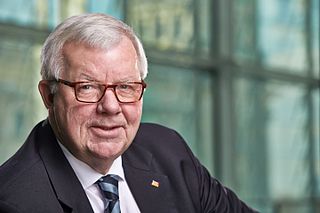
Alliance 90/The Greens, often simply Greens, is a green political party in Germany. It was formed in 1993 as the merger of The Greens, formed in West Germany in 1980, and Alliance 90, formed in East Germany in 1990. The Greens had itself merged with the East German Green Party after German reunification in 1990.

Werner Karl Heisenberg was a German theoretical physicist and one of the key pioneers of quantum mechanics. He published his work in 1925 in a breakthrough paper. In the subsequent series of papers with Max Born and Pascual Jordan, during the same year, this matrix formulation of quantum mechanics was substantially elaborated. He is known for the uncertainty principle, which he published in 1927. Heisenberg was awarded the 1932 Nobel Prize in Physics "for the creation of quantum mechanics".

Walther Wilhelm Georg Bothe was a German nuclear physicist, who shared the Nobel Prize in Physics in 1954 with Max Born.

Johannes Hans Daniel Jensen was a German nuclear physicist. During World War II, he worked on the German nuclear energy project, known as the Uranium Club, where he contributed to the separation of uranium isotopes. After the war, Jensen was a professor at the University of Heidelberg. He was a visiting professor at the University of Wisconsin–Madison, the Institute for Advanced Study, University of California, Berkeley, Indiana University, and the California Institute of Technology.

The German nuclear weapons program was an unsuccessful scientific effort led by Germany to research and develop atomic weapons during World War II. It went through several phases of work, but in the words of a historian, it was ultimately "frozen at the laboratory level" with the "modest goal" to "build a nuclear reactor which could sustain a nuclear fission chain reaction for a significant amount of time and to achieve the complete separation of at least tiny amount of the uranium isotopes." Scholarly consensus is that it failed to achieve these goals.

Wyhl is a municipality in the district of Emmendingen in Baden-Württemberg in southwestern Germany.

Burglengenfeld is a town in the district of Schwandorf, in Bavaria, Germany. It is situated on the river Naab, 22 km north of Regensburg.
The Anti-WAAhnsinns Festivals were political rock concerts, which took place in Germany in the 1980s. Their purpose was to support protests against the planned nuclear reprocessing plant Wackersdorf in Wackersdorf. In 1986, the fifth festival marked the peak of the protest movement against the plant. With over 100,000 people attending on July 26 and 27, Burglengenfeld became the venue of the until then-largest rock concert in the history of Germany. The line-up included some of Germany's most popular music acts of the time such as BAP, Die Toten Hosen, Udo Lindenberg, Rio Reiser, Herbert Grönemeyer. The festivals resulted in an unexpected amount of media coverage for the anti-nuclear movement in Germany. Contrary to expectations of government agencies, however, the festival remained completely peaceful. As a result of the overwhelming protests the planned nuclear reprocessing plant was never built.

The Federal Ministry of the Environment, Nature Conservation and Nuclear Safety, abbreviated BMU, is a cabinet-level ministry of the Federal Republic of Germany. It has branches in Bonn and Berlin.

The anti-nuclear movement in Germany has a long history dating back to the early 1970s when large demonstrations prevented the construction of a nuclear plant at Wyhl. The Wyhl protests were an example of a local community challenging the nuclear industry through a strategy of direct action and civil disobedience. Police were accused of using unnecessarily violent means. Anti-nuclear success at Wyhl inspired nuclear opposition throughout Germany, in other parts of Europe, and in North America. A few years later protests raised against the NATO Double-Track Decision in Germany and were followed by the foundation of the Green party.
Hildegard Breiner is from Vorarlberg, Austria, where she and her late husband led the anti-nuclear campaign against Zwentendorf Nuclear Power Plant in the 1970s. In 1978, an unprecedented 85 percent of the voters in Vorarlberg cast their votes against Zwentendorf, tipping the scales of the nationwide referendum. In the second half of the 1980s, Hildegard Breiner played a major role in opposition to the nuclear reprocessing plant Wackersdorf to be built at Wackersdorf in neighbouring Bavaria, Germany. In 2004, Hildegard Breiner received the Nuclear-Free Future Lifetime Achievement Award.

Biermösl Blosn was a Bavarian musical and cabaret band known for combining satirical texts with traditional folk music. It was founded in 1976 by three brothers - Hans, Christoph and Michael Well - and often works with political cabaret artist Gerhard Polt. The name derives from "Beerenmoos", a part of the Haspelmoor in the district of Fürstenfeldbruck that was planned to be transformed in a large airport and a waste dump, and "Blosn", a Bavarian word for "group".
Stefan Krachunov is a Bulgarian footballer currently playing as a left back.

Borislav Stoyanov is a Bulgarian footballer currently playing for TV Wackersdorf in the Futsal-Regionalliga Süd as a goalkeeper.

The Wackersdorf nuclear reprocessing plant is a reprocessing plant in Wackersdorf in Bavaria, Germany. Because of protests the plant was never completed. Today it is an industrial site with no special features.

Markus Giesecke is a German futsal player from Regensburg, Germany who currently plays for Futsal Club Regensburg, a futsal club based in Regensburg, Germany.

TV Wackersdorf is a German sports club from Wackersdorf, which was founded in 1912 as Turnverein "Glück-Auf" Wackersdorf 1912 e.V. The club's futsal team plays in the Futsal-Regionalliga, which is the highest level of futsal in Germany.

The Futsal-Bayernliga is the highest futsal league in the state of Bavaria and the second tier of futsal under the Futsal-Regionalliga Süd and above the Futsal-Bezirksliga in the German futsal league system.

Michael Fuchs is a German politician who served in the Bundestag from 2002 to 2017. He was elected European deputy chairman of the Trilateral Commission in 2010.





















